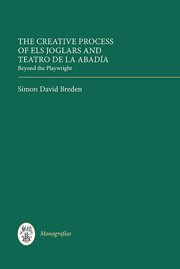4 - Experiential Performance
from Part I - Els Joglars
Published online by Cambridge University Press: 05 April 2014
Summary
In this final chapter on Els Joglars I will examine the company's performances as they emerge from rehearsal in the light of the Constance School's theory of ‘aesthetic response’, coupled with the notion of ‘experiential theatre’. The chapter illustrates how the company's preparatory work and thought-process leads to an audience engagement with the show at a heightened level of intellectual and emotional participation, thus exploring the notion of ‘experiential’ as encompassing or merging reason with sensation.
Much of the difficulty of analysing theatre stems from the limitations of analytical tools when it comes to quantifying performance, a necessarily transient and subjective area of study. Phenomenology, as described by Maurice Merleau-Ponty, goes some way towards generating a methodology for acknowledging the difficulties inherent in interpreting art by attempting to define the notion of lived experience: ‘Phenomenology is the study of essences; and according to it, all problems amount to finding definitions of essences: the essence of perception, or the essence of consciousness’ (Merleau-Ponty, 2007: vii). This is not, however, a straightforward process: ‘At the outset of the study of perception, we find in language the notion of sensation, which seems immediate and obvious: I have a sensation of redness, of blueness, of hot or cold. It will, however, be seen that nothing could in fact be more confused, and that […] traditional analyses missed the phenomena of perception’ (Merleau-Ponty, 2007: 3). Critics mostly focus on the notion of a fixed text or on performances with ‘single’ meanings: ‘Traditional ways of analysing drama and theatre have tended to focus on what happens on stage or in the script, assuming that theatrical scripts and productions “have” universal meaning that is available for interpretation by audiences anywhere’ (Knowles, 2004: 9).
- Type
- Chapter
- Information
- The Creative Process of Els Joglars and Teatro de la AbadíaBeyond the Playwright, pp. 143 - 154Publisher: Boydell & BrewerPrint publication year: 2014

